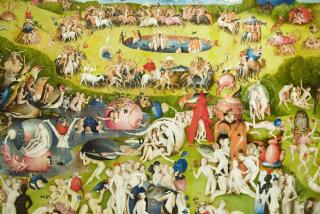BOOK REVIEW / SCIENCE FICTION : Giving Them All Some of That New-Time Religion : PARABLE OF THE SOWER <i> by Octavia E. Butler</i> ; Four Walls Eight Windows $19.95, 299 pages
To proclaim, in 1990s Los Angeles, that Octavia Butler loves earthquakes may be akin to accusing someone in 1690s Salem of sorcery. But if her accomplished novel is any judge, there can be no doubt of it.
The Big One, first of all, allows Lauren, the protagonist--an assured, visionary woman still in her late teens--to lead her ragtag followers away from the urban doom of post-apocalyptic 2020s California to a relatively safe rural haven. But more importantly, temblors nicely symbolize “Earthseed,” the young prophet’s credo of change:
“The ground beneath your feet moves / changes,” she writes in her diary. “The galaxies move through space . . . evolving. / God is change. / God prevails.”
Common in science fiction ever since the king of science fact, Einstein, was proven wrong in assuming that we lived in a static universe, the concept of the cathartic earthquake was developed most dramatically in William Gibson’s “Virtual Light” (1993).
Gibson’s Big One proved liberating, destroying “the System” and thus allowing zestful bohemians to suspend a city of Superglued packing grates from the San Francisco-Oakland Bay Bridge and to house nine fine Thai restaurants within the wingless carcass of a 747.
Butler is well aware that given our sensible human desire to live in a predictable world, Lauren’s gospel of change is going to be a hard sell. She doesn’t make it easy, for instance, for Lauren to woo her first convert, Travis.
Travis: “I still can’t see change or entropy as God.”
Lauren: “Then show me a more pervasive power than change.”
Travis: “Change does scare most people.”
Lauren: “I know. God is frightening. Best to learn to cope.”
Travis: “Your God doesn’t care about you at all.”
Lauren: “All the more reason to care for myself and others.”
Butler’s religion of change isn’t as coldly Ayn Rand-ian as it first sounds, for like Isaac Asimov, she believes that although we cannot prevent change, we can foresee and thus shape it. We may not be able to banish temblors, so to speak, but we can retrofit freeways.
Butler, however, commits the same fallacy as Asimov in assuming that because we know where the vast physical universe is going (according to the Second Law of Thermodynamics, it’s dissipating, expanding and cooling down), we also know where our tiny social universe is heading (to hell in a handbasket, most science-fiction writers say).
Given this cynical premise, the conclusion to Lauren’s theology is logical: “The destiny of Earthseed is to take root among the stars.” Butler, however, gives us no reason to believe that the problems plaguing us on Earth won’t simply be replicated once we high-tail it into space. Lauren’s Utopia--a community where “people look out for each other”--is hardly revolutionary.
Happily, though, “Parable of the Sower” succeeds much more impressively on another, less polemical and clearly autobiographical level.
Butler’s grandmother was a Louisiana field worker who transformed 160 parched California acres into the chicken ranch where Butler grew up as an only child. That Lauren’s followers find a home here on a similar stretch of dry California land is not coincidental. While Butler explicitly is crafting a religion of change, subconsciously she may be summoning a community of friends to her childhood home.
Butler’s similarity to Lauren allows her to render Lauren’s childhood world with a vividness so rare in science fiction that it’s no wonder she’s won both the Hugo and Nebula awards:
“My stepmother hands me an armload of my youngest brother’s diapers,” Lauren writes. “I take them, walk back toward the house where she has left her big wicker laundry basket, and pile the diapers atop the rest of the clothes. The basket is full. I look to see that my stepmother is not watching me, then let myself fall backward onto the soft mound of stiff, clean clothes. For a moment, the fall is like floating. I lie here, looking up at the stars.”
More to Read
Sign up for our Book Club newsletter
Get the latest news, events and more from the Los Angeles Times Book Club, and help us get L.A. reading and talking.
You may occasionally receive promotional content from the Los Angeles Times.





